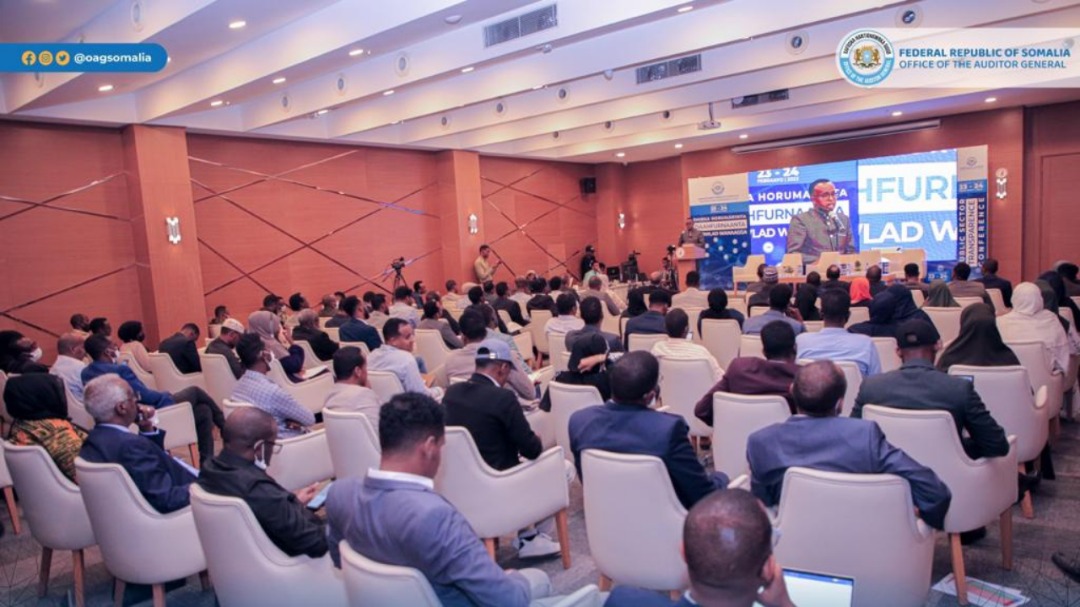Public Sector Good Governance Conference Concluded in Mogadishu

Somalia’s nascent state institutions are recovering from a long period of conflict with critical reforms underway to establish more effective, accountable, and inclusive institutions.
The Office of the Auditor General of Somalia (OAGS) is a critical pillar of the national accountability architecture and is mandated to audit all public institutions to promote accountability. In this respect, the OAGS has convened a two-day conference on Public Sector Good Governance in Somalia between 23-24 February 2022.
The two-day conference included critical discussions and updates among senior oficers from all the Government Ministries, Departments, and Agencies (MDAs) and representatives from the private sector, civil society, and academia on the status of the public sector accountability and good governance in the country and how to improve it.
Themed “Leveraging Technology to Enhance Good Governance in Somalia”, the conference aimed to raise awareness among the policymakers and other participants on the increasing role and use of technology in strengthening good governance and establishing sound public financial management systems.
Auditor General of Somalia, Mr. Mohamed M. Ali “Afgoi” officially opened the conference and touched on the institutional reforms in the country since 2012 including the recent debt-relief efforts allowing Somalia to rejoin the global economy. AG Afgoi has noted “That during the last four years we have seen how technology can be an important instrument and a catalyzer of the ongoing Public Financial Management (PFM) reforms to establish sound accountability systems”.
The management of public resources requires effective and rule-based financial governance systems allowing revenue mobilization and collection and reporting on tax to strengthen accountability and citizen services. “And as such, we need to leverage technology to enhance good governance in the country. Furthermore, the OAGS plans to conduct ICT audits to assess readiness and management controls of these infrastructures” assured Mr. Afgoi.
“It’s necessary that Somalia participates in the fourth industrial revolution and fully harnesses technology to guarantee good governance across all government sectors,” observed, H.E. Mr. Abdi Sheikh Ahmed, Minister of Communications and Technology. “Much progress has been made in digitalizing the government operations, such as developing human-centric policies and strategies towards adoption of e-Government”, he went on to say.
Similarly, Mr. Mohamed M. Hassan, Director of SIMAD iLab, discussed how technology levels the playing field and provides everyone with a greater opportunity for success in both the public and private sectors.
On his part, Executive Director of the Economic Council, Dr. Ali Isse affirmed the significance of transparency for good governance and the vital role that technology plays in achieving transparency. “There’s pervasive and endemic poor public sector governance in the country and it will take security and stability to ensure good public governance. Technology plays a critical role in this respect as it increases transparency, participation and efficient delivery of public goods and services,” said the Executive Director.
H.E. Dr. Fawziya Abikar, Minister of Health & Social Care, also discussed some of the Ministry of Health’s recent experiences in leveraging technological systems to tackle the COVID-19 pandemic and maintaining good governance in all of her ministry’s respective departments.
In the closing remarks, Auditor General Mohamed Ali has thanked all the participants for their fruitful deliberations and timely contributions throughout the conference. He further suggested that more stakeholders, including the Federal Member States (FMSSs) and Development Partners, will be able to actively take part in the next editions of the conference so as to take the discussions on improving public sector good governance in Somalia to the next higher level.
The event drew together more than a hundred participants across all sectors including H.E. Abdi Sheikh Ahmed, Minister of Communications and Technology, H.E. Dr. Fawziya Abikar, Minister of Health and Social Care, Dr. Ali Isse, Executive Director of the National Economic Council, Ms. Halima Ismail Ibrahim, Chair of the National Independent Electoral Commission, Heads and Director Generals from various government institutions as well as representatives from the private sector, civil society, and academia.
Goobjoog News